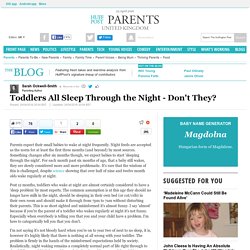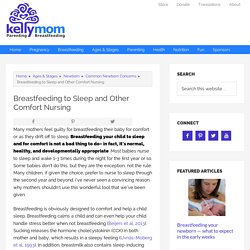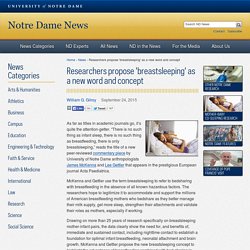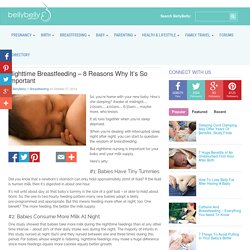

Coping. Expectations. BF / formula. SIDS. Sleep training. Safe Sleep & the Breastfed Baby - La Leche League GB. Toddlers All Sleep Through the Night - Don't They? Parents expect their small babies to wake at night frequently.

Night feeds are accepted as the norm for at least the first three months (and beyond) by most sources. Something changes after six months though, we expect babies to start 'sleeping through the night'. For each month past six months of age, that a baby still wakes, they are slowly considered more and more problematic. It's rare that the wisdom of this is challenged, despite science showing that over half of nine and twelve month olds wake regularly at night. Post 12 months, toddlers who wake at night are almost certainly considered to have a 'sleep problem' by most experts.
I'm not saying it's not bloody hard when you're on to year two of next to no sleep, it is, however it's highly likely that there is nothing at all wrong with your toddler. Why Do Toddlers Wake So Often At Night? I should add a caveat here, a lot of people think I "know all of the answers", I don't. Struggling with a sense of control and autonomy. Elizabeth.Pantley.The.No.Cry.Sleep.Solution 1. Breastfeeding to Sleep and Other Comfort Nursing. Many mothers feel guilty for breastfeeding their baby for comfort or as they drift off to sleep.

Breastfeeding your child to sleep and for comfort is not a bad thing to do– in fact, it’s normal, healthy, and developmentally appropriate. Most babies nurse to sleep and wake 1-3 times during the night for the first year or so. Some babies don’t do this, but they are the exception, not the rule. Many children, if given the choice, prefer to nurse to sleep through the second year and beyond. I’ve never seen a convincing reason why mothers shouldn’t use this wonderful tool that we’ve been given. Breastfeeding is obviously designed to comfort and help a child sleep. If breastfeeding your child to sleep and/or nursing your child for comfort is working for YOU and your family, that’s all that really matters! Following are some Frequently Asked Questions… Additional resources My child sometimes nurses for comfort, when he’s obviously not hungry.
Comfort nursing is normal. Researchers propose 'breastsleeping' as a new word and concept. As far as titles in academic journals go, it’s quite the attention-getter.

“There is no such thing as infant sleep, there is no such thing as breastfeeding, there is only breastsleeping,” reads the title of a new peer-reviewed commentary piece by University of Notre Dame anthropologists James McKenna and Lee Gettler that appears in the prestigious European journal Acta Paediatrica. McKenna and Gettler use the term breastsleeping to refer to bedsharing with breastfeeding in the absence of all known hazardous factors. The researchers hope to legitimize it to accommodate and support the millions of American breastfeeding mothers who bedshare as they better manage their milk supply, get more sleep, strengthen their attachments and validate their roles as mothers, especially if working. This Is Why Your Baby Doesn't Sleep Through The Night. Nighttime Breastfeeding - 8 Reasons Why It's So Important. So, you’re home with your new baby.

How’s she sleeping? Awake at midnight… 2:00am… 4:00am… 6:30am… maybe more, who knows. It all runs together when you’re sleep deprived. When you’re dealing with interrupted sleep night after night, you can start to question the wisdom of breastfeeding. But nighttime nursing is important for your baby and your milk supply. Here’s why: #1: Babies Have Tiny Tummies Did you know that a newborn’s stomach can only hold approximately 20ml of fluid?
It’s not until about day 10 that baby’s tummy is the size of a golf ball – or able to hold about 60ml. . #2: Babies Consume More Milk At Night One study showed that babies take more milk during the nighttime feedings than at any other time interval – about 20% of their daily intake was during the night.